| Main page | – Alumni Reunion | |
| – Webinar Series | ||
| – Alumni Summit | – Alumni Presentations |
Five presenters talked about their current efforts and future career visions solidly built on clear convictions and thoughts behind them. In each theme session, their alumni colleagues joined to support and enrich the discussion.
The next-generation young leaders, who were high school students at the time of their participation in the past TYCA volumes, have firmly established their individual goals, and were moving forward as undergraduate or master students of universities, or even young professionals in the U.S.A., Europe, Asia and Japan. All presenters echoed that the experiences and lessons learned at past TYCA have given large insights for them to develop and harness their long-term goals and identify respective fields to channel their resources to realize their dreams. Please see below for a summary of each session.
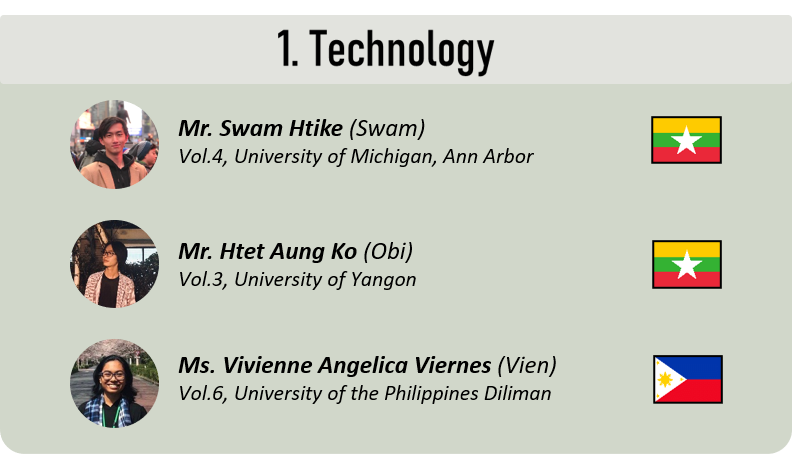 |
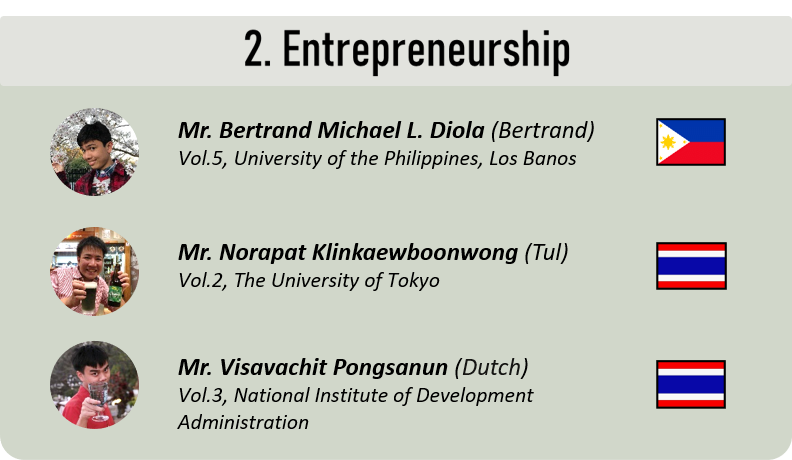 |
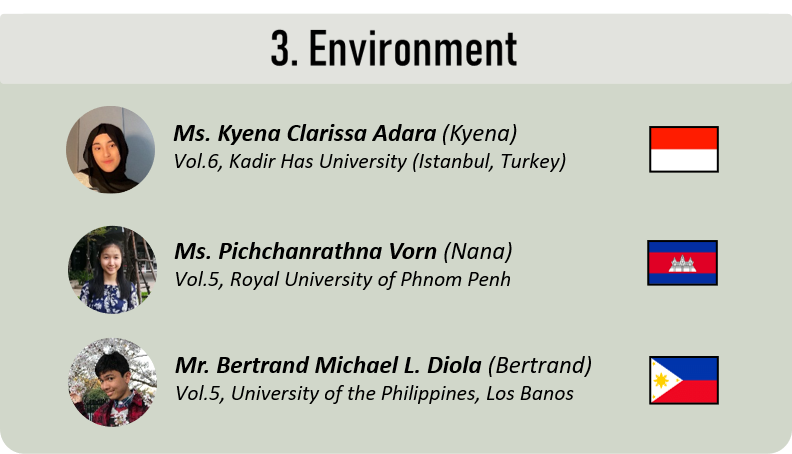 |
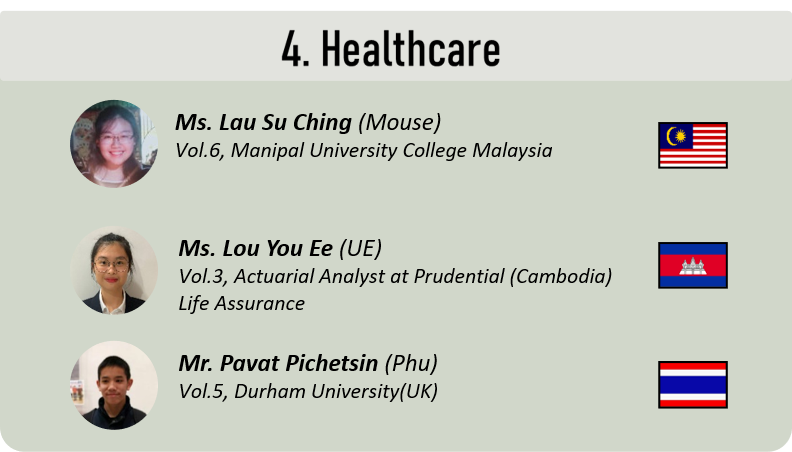 |
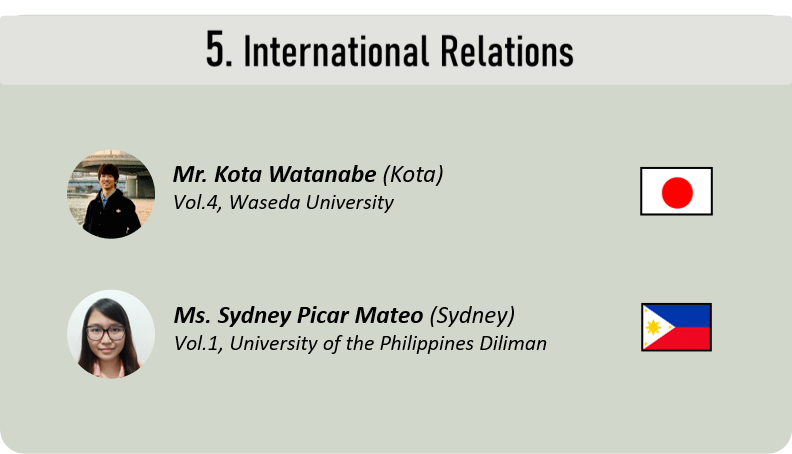 |
*Affiliation is as of March 2022
*Their names (nicknames in parenthesis) are followed by the current affiliation and the countries which they study or work in.
*Mr. Neungleuthai Charernphon(Neung), an alumni of Vol.3, could not join the summit.
1. Technology
| Presenter | Mr. Swam Min Htike (Swam) |
Myanmar, Vol.4 University of Michigan, Ann Arbor |
| Discussion members | Mr. Htet Aung Ko (Obi) |
Myanmar, Vol.3 University of Yangon |
| Ms. Vivienne Angelica Viernes (Vien) |
the Philippines, Vol.6 University of the Philippines Diliman |
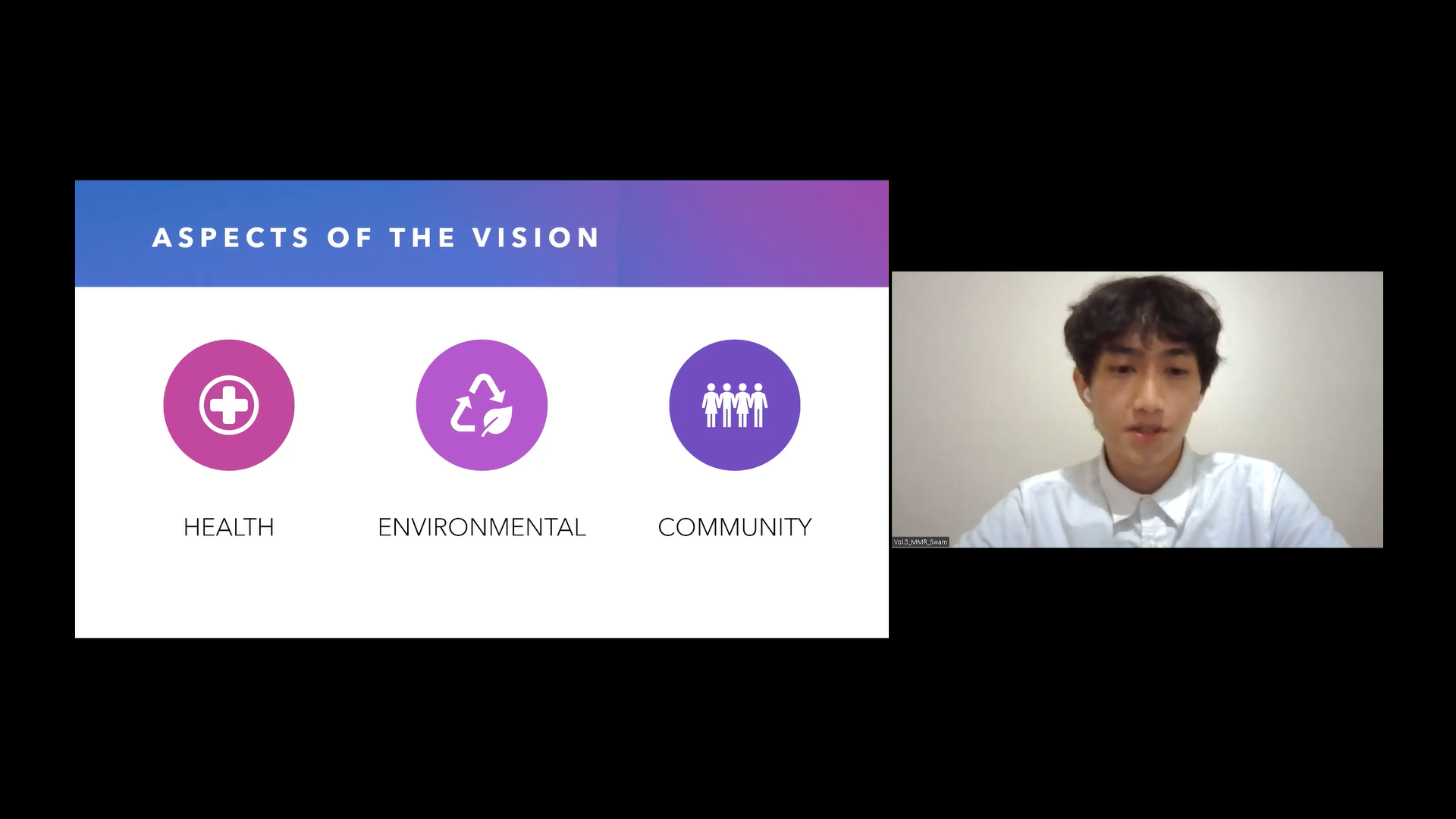 |
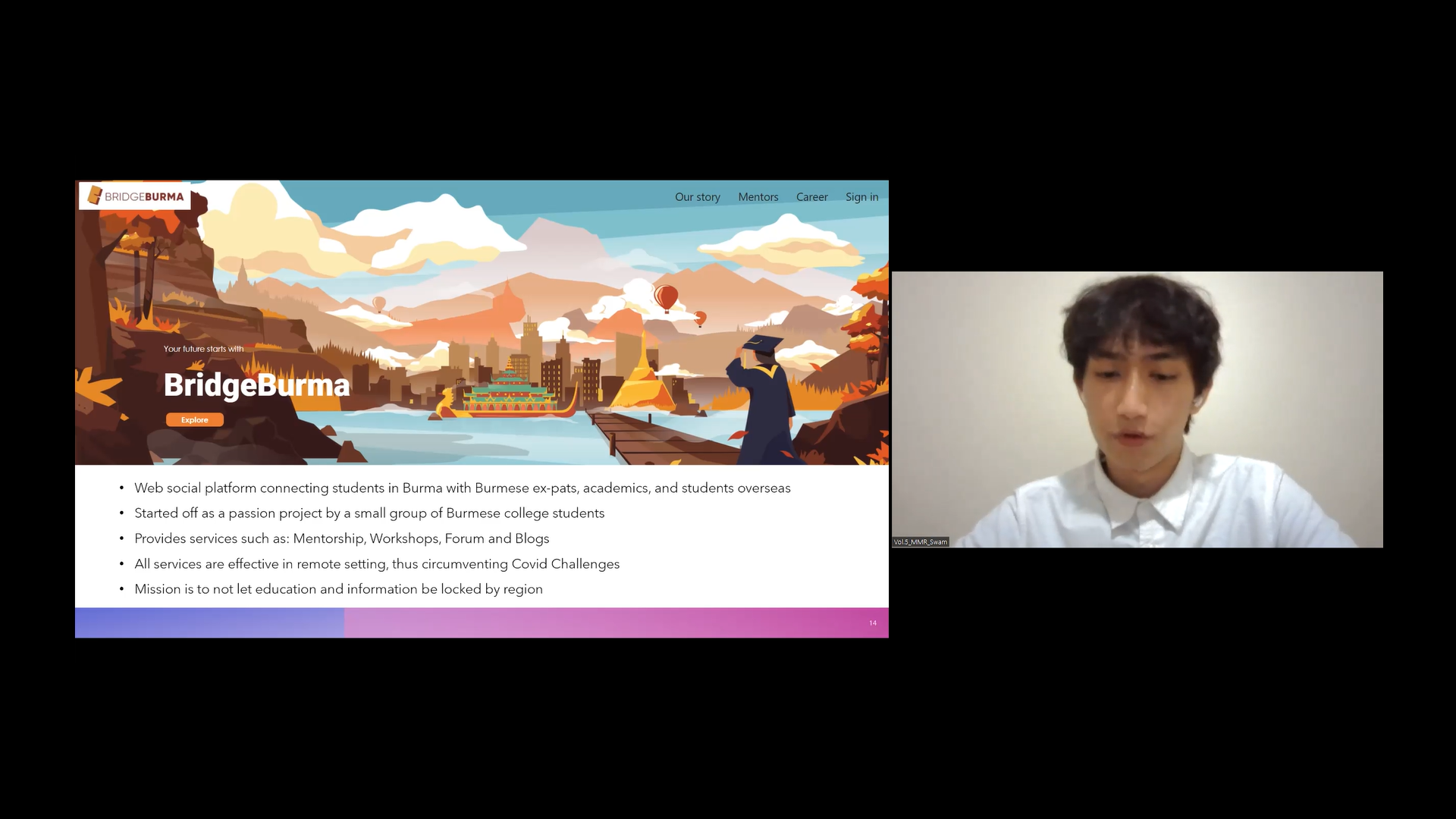 |
Swam’s future vision is “Prosperity through technology.” His belief is to use the power of technology to realize prosperous society, especially through enhancing public health, improving environment, and breeding sound community development. Concerning public health, he discussed the role advanced technologies such as those that kept track of COVID-19 infections for effective pandemic dissemination prevention recently played. Concerning environment, he argued need to accelerate shift to renewable energy coupled with cost reduction to ensure transition from fossil-fuel based society. He also discussed his desire to realize inclusive society, by extending equal educational opportunities to under-priviledged children.
Swam introduced his past experiences up until his latest endeavours as a student to optimize battery management for electronic vehicles and corporate internship plan for latest security systems.
He concluded societal transformation through technology would require collaboration of talented people — not a result of achievement of a single excellent engineer. Maxiumum efforts must be made, he said, to discover and support “Lost geniuses”, who are talented but are unable to receive quality education to build up their capacities due to underpriviledged circumstances. To support the cause, he helped to launch a new web site with his colleagues called BridgeBurma, by which young Burmese students will have chances to connect on-line with Burmese expats, academics and students studying abroad such as Swam and obtain chances to participate in forums, workshops and other opportunities to expand their horizon beyond the limitations of geography.
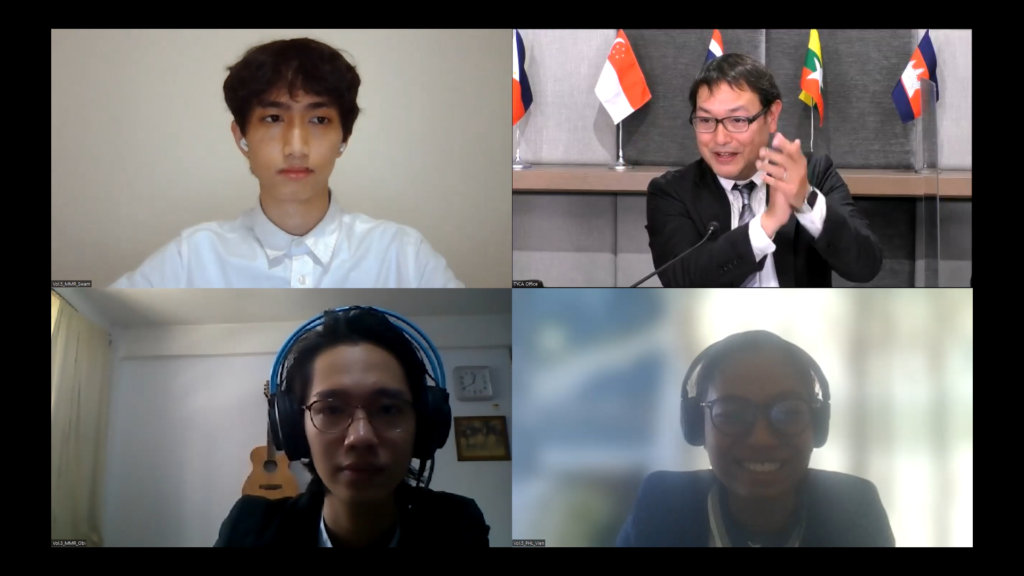
Vien, the alumni who joined Vol.5 together with Swam, totally supported Swam’s argument, as she also actively studies battery technologies for power plants and the broad industries at university. She expressed a strong consent to Swam in that technology is not merely to make flashy things but to realize a society with inclusivity. “Future should be for everyone”, she said, and no body should be left behind. Obi, another Myanmar alumni, who is actively promoting remote educational initiative for children in his country, also touted the passion of Swam.
2. Entrepreneurship
| Presenter | Mr. Bertrand Michael L. Diola (Bertrand) |
the Philippines, Vol.5 University of the Philippines, Los Banos |
| Discussion members | Mr. Norapat Klinkaewboonwong (Tul) |
Thailand, Vol.2 The University of Tokyo |
| Mr. Visavachit Pongsanun (Dutch) |
Thailand, Vol.3 National Institute of Development Administration |
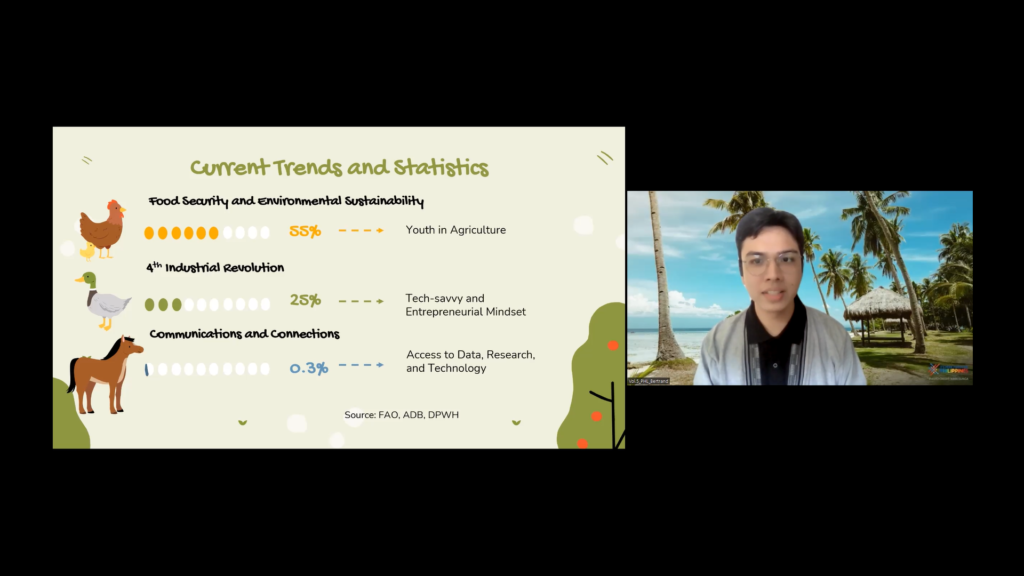 |
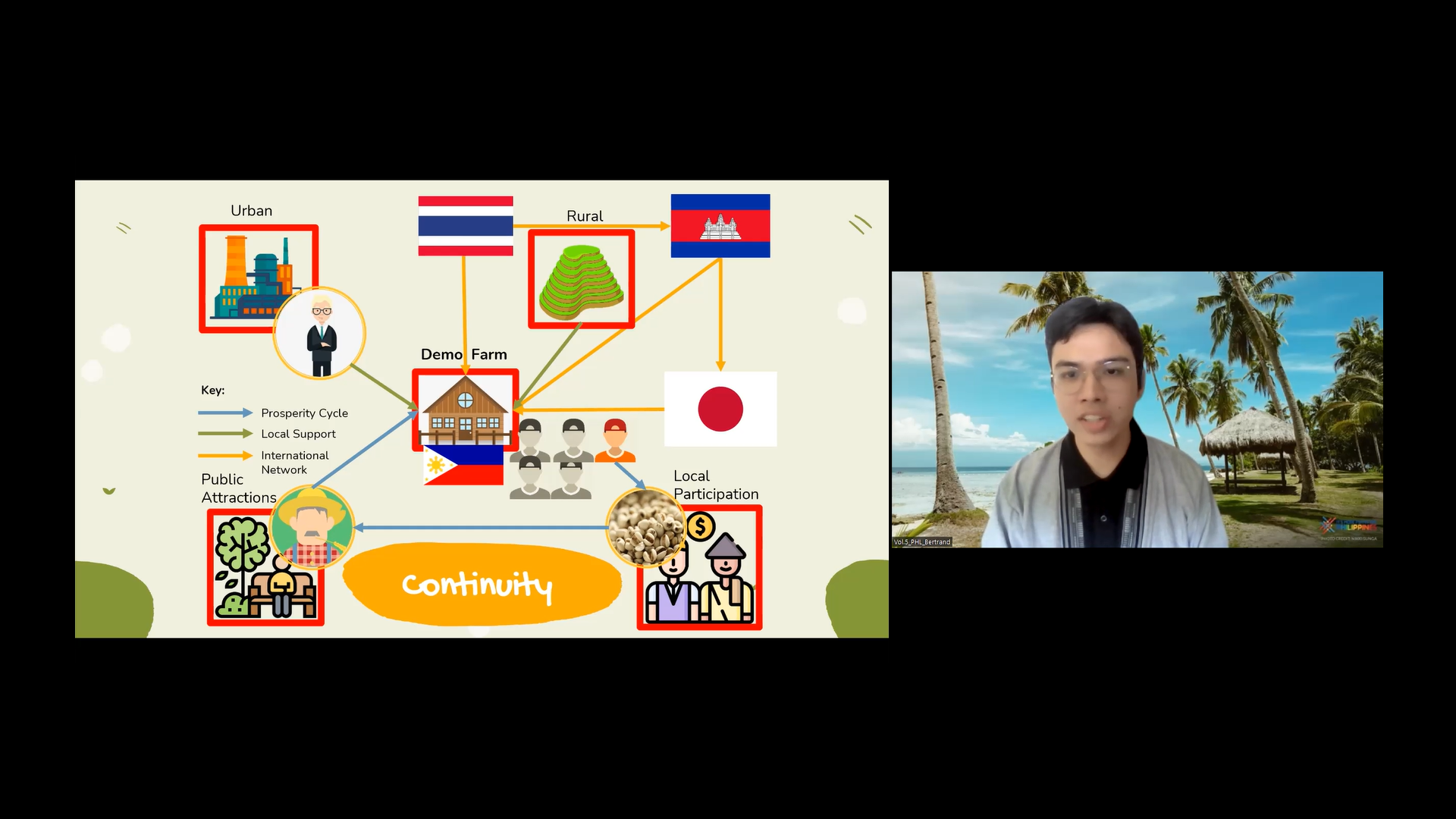 |
Bertrand’s long-term vision, targeted at 2040, is to enhance and fulfill the potentials of the Philippines’ agricultural industry with the power of engineering and entrepreneurship.
At university, he is pursuing the innovationeering (innovation + engineering) track, which involves technopreneurship (technology + entrepreneurship) and a market study on the business potential of existing research projects.
He first discussed many facets to modernize the agricultural industry such as mechanization, environmental control, postharvest processes, as well as the social aspects, such as machinery management, economics, marketing, laws, ethics, and culture.
He said the past on-site experience of a local agricultural immersion in the Philippines gave him agricultural skills and appreciation and a motivation to create an ideal demo farm someday.
Bertrand predicted that by 2040 more people will act to address food security and environmental sustainability especially due to higher overpopulation and climate change rates. He believed the on-going technology innovation promoted by the government of the Philippines, such as AI and big data and diffusion of electricity and smartphone connectivity in the country are positive trends to support precision agriculture and improve its productivity.
Bertrand also said another positive sign is more Filipino youths are returning to agriculture these days and they have a tech-savvy and entrepreneurial mindset.
Bertrand’s vision is to use all his learnings to help make the farmlands of his parents’ hometowns productive, utilizing the land as a model for a prosperous rural agricultural community by building a demo farm.
He believes technology diffusion is more important than innovation, as many data, research, and technology are already available, but they need to reach ordinary farmers and fisherfolk effectively. “The demo farm and network could introduce appropriate technologies and environmentally sound practices.”
And his scope of imagination of the future agriculture was not limited to his beloved country alone but across other southeast Asian countries and Japan.
Bertrand continued, “By 2040, I imagined that more demo farms would sprout in Asia. …First, it would be a training ground for technical knowledge on the best modern agricultural practices. Second, it involves local community participation by providing employment while they reap the rewards. Third, it could become a public attraction by adding recreational aspects such as landscaping, selling products, meditation spots, and others.”
Bertrand expressed his appreciation that he learned this skill of futures thinking thanks to joining the TYCA program. “My current vision is similar to my group’s envisioned demo-school that teaches rural communities practical knowledge on utilizing their regional resources, connecting Southeast Asian and Japanese communities,” he said.
Bertrand hopes to establish a network of young agricultural entrepreneurs or technocrats in the Philippines, ASEAN, and Japanese community to mobilize and exchange knowledge, resources, and technologies. Bertrand perceives one of the largest bottleneck is the community’s sociocultural nature, as young people tend to view farming as back-breaking and prefer cities instead, but he hopes to see the success stories of young Agri-entrepreneurs could inspire more communities.
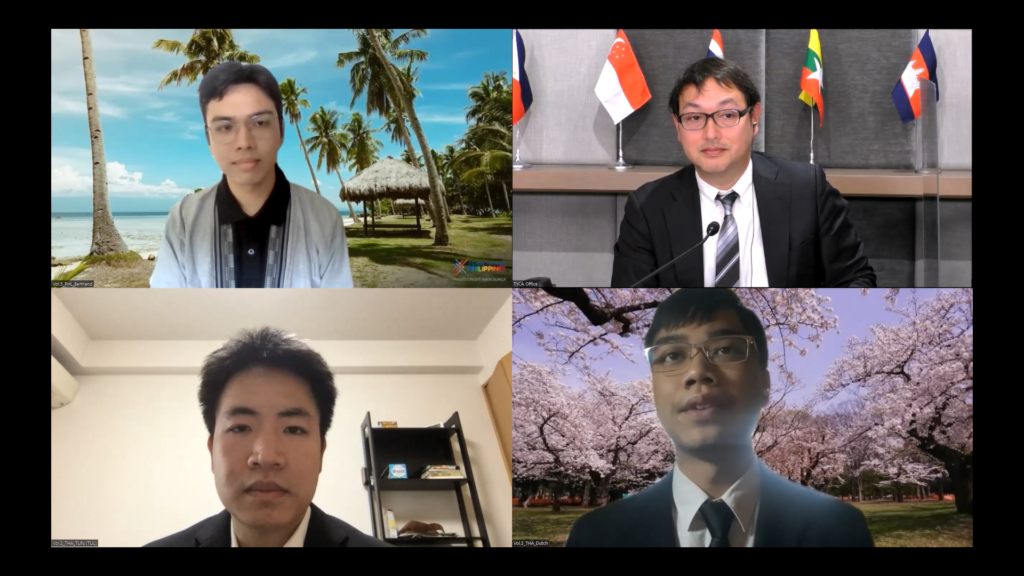
One of the discussion members, Tul, an alumnus of Vol.2, praised Bertrand’s proposal as amazing and a solid idea, since he tried to mix various hubs of knowledge with technology and entrepreneurship to achieve his final goal. Tul mentioned food security and environmental sustainability, which Bertrand is approaching, are among the most critical issues of concern for the future. In the meantime, Tul also commented we must take heed of possible price hikes of products, when we apply advanced research and development into final products. Tul is also engaged in biotechnology research himself at university, and “we need a lot of money to improve our products scientifically.”
Dutch, another discussion member, supported Bertrand’s idea as very systematic, as Bertrand started his presentation from what led him to get interested in agriculture first, and he built up his logic and discussed his final goal and mission. Dutch also appreciated Bertrand’s insight into broadening the scope to rural areas and share knowledge of technology, as more and more people tend to move to urban areas these days, and he regarded knowledge sharing between urban and rural areas as well as with other countries as very meaningful.
Bertrand finally thanked Tul and Dutch for their comments, and added that he wanted to deepen studies into entrepreneurship to enhance market potentials of the technologies he is learning, and technologies are made more readily accessible to ordinary people.
3. Environment
| Presenter | Ms. Kyena Clarissa Adara (Kyena) |
Indonesia, Vol.6 Kadir Has University (Istanbul, Turkey) |
| Discussion members | Ms. Pichchanrathna Vorn (Nana) |
Cambodia, Vol.5 Royal University of Phnom Penh |
| Mr. Bertrand Michael L. Diola (Bertrand) |
the Philippines, Vol.5 University of the Philippines, Los Banos |
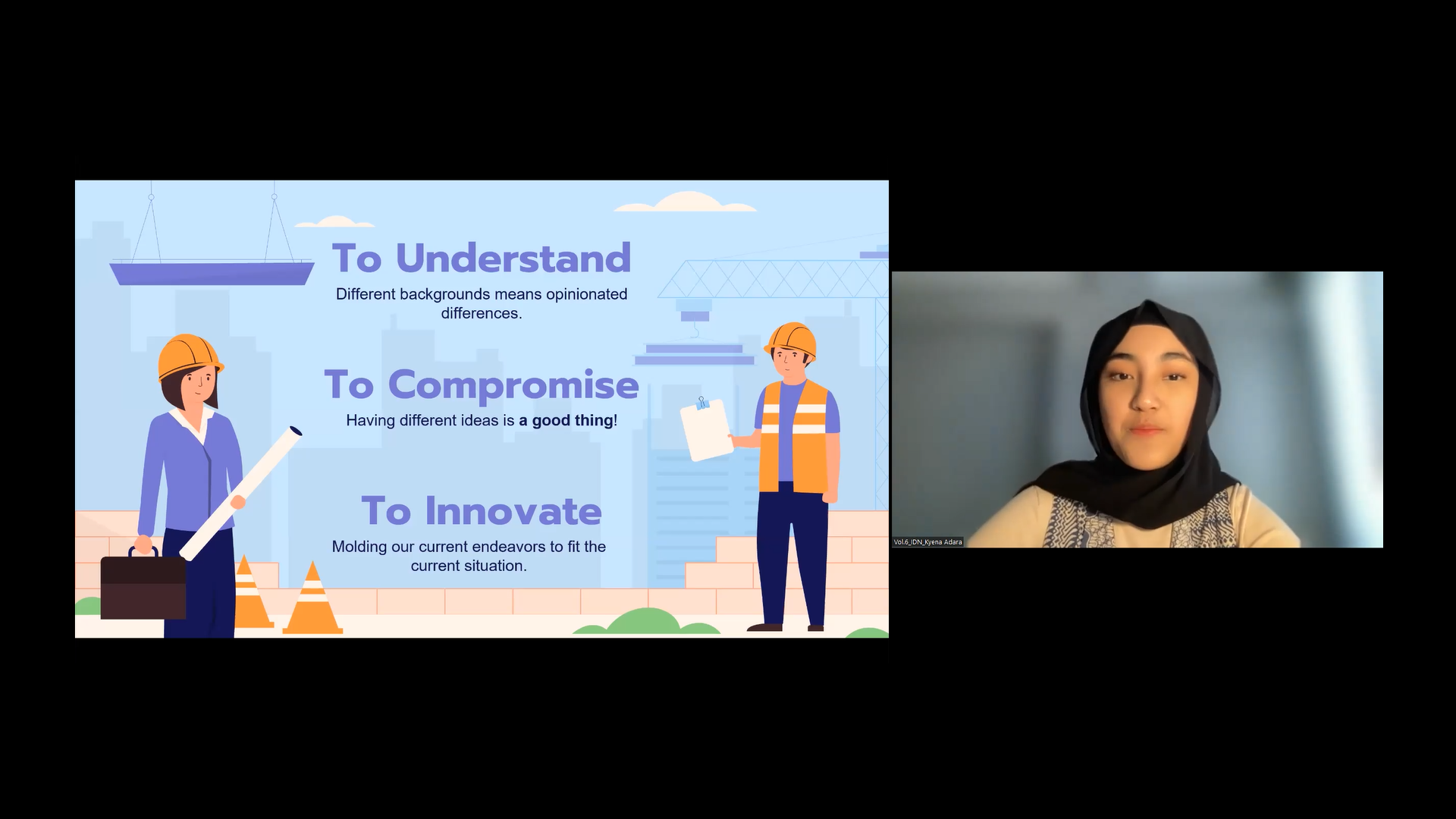 |
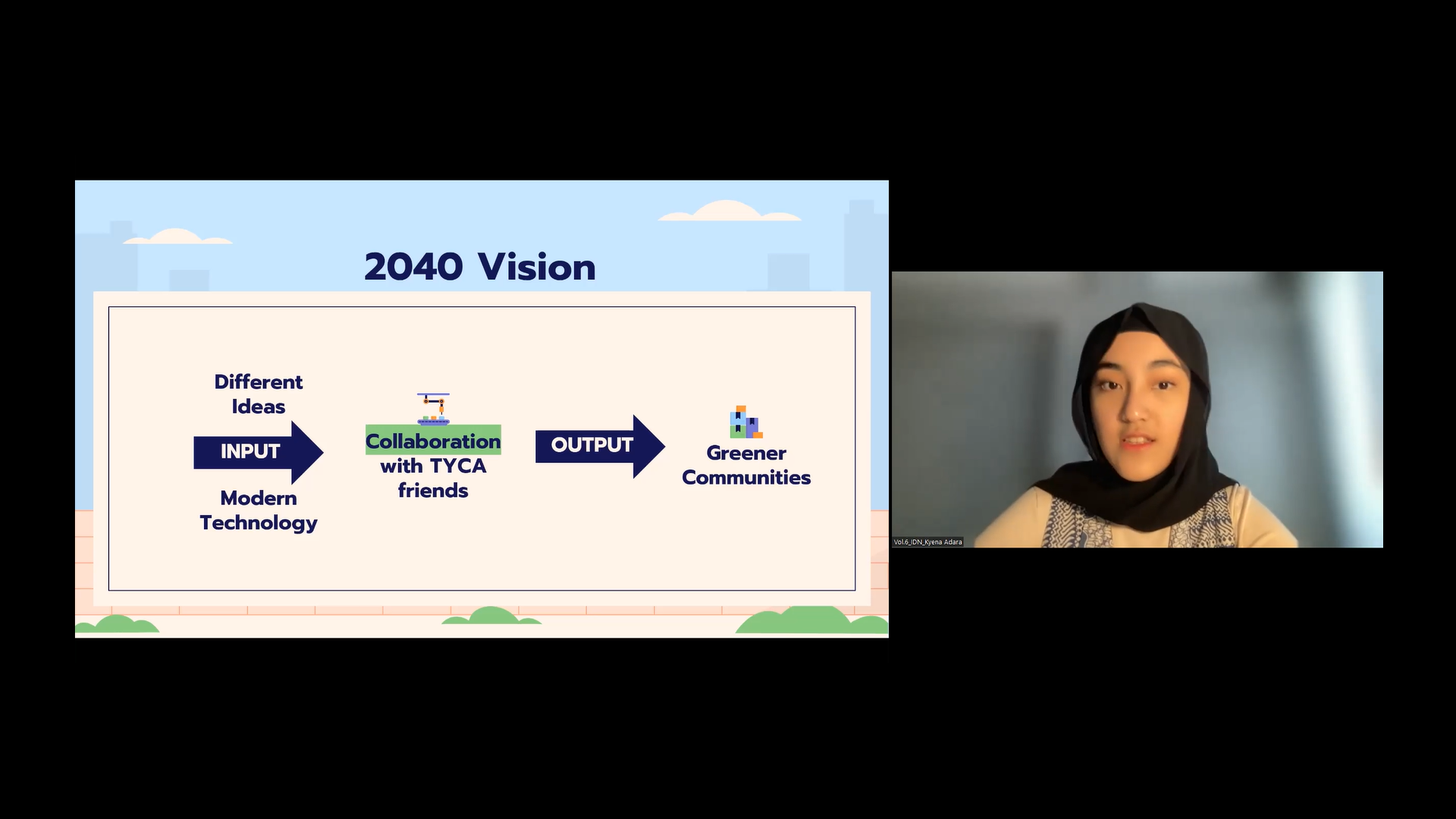 |
Kyena, currently a student of architecture at a university in Turkey, discussed how Covid-19 has largely changed her course of study at university, and her decision about future career goal.
Kyena, born and brought up in Indonesia, was long dreaming to study in Japan until Covid-19 occurred. After deep deliberations and new experiences she immersed herself in, she decided to study architecture in Turkey. Being equally passionate about the environment and architectural design, she has “made it a career goal to incorporate local and sustainable ways in creating not only aesthetically appealing homes and buildings but, helping the environment in the long run.”
Her intern experiences of the past two years have broadened her horizon and vision, as well as finding joy of working with many people beyond country border, and last but not least, to contribute to her own country. She first worked as a content development and operations intern at an ed-tech company. She contributed her skills into creating fun and interesting weekly lessons alongside assisting native teachers from around the globe to create the best environment for the young Indonesian students to learn the English language. She also volunteered to become a part-time content-researcher at a youth-led organization to support research on Indonesian trends and socio-political issues that are rarely covered by mainstream media.
She believes, to achieve this dream in 10 to 20 years time, collaboration is the key to success. She mentioned an example of building a house that requires not only the creativity of an architect but also requires the technical skills of a civil engineer and manpower from construction workers.
She also said, “Incorporating sustainability and technology into these designs will require collaboration from different individuals in creating a space that is safe for the environment without taking away elements of what it takes to create a home.”
She continued, “With the help of my TYCA friends, we can create a more sustainable environment to live in all across Asia…. The TYCA that I attended taught me that we were all attending the same event with the same vision, which was to create a better future for Asia and the world as a whole.”
Kyena also pointed out when people of different backgrounds with different circumstances work together, there might be a conflict of interest that can result in unwanted circumstances. “The key to working with different people is merely understanding… In working together, we should always take note that a good way to dispute conflict is by compromising these different ideas.”
She finally discussed sudden events beyond human control could happen such as the current ongoing COVID-19 pandemic, and great leaders are those who take these problems as an opportunity to grow. With this, innovation is important; problems like these may arise but it’s our job as future global leaders to find the right innovative solution to tackle as well as grow out of it. “My decision to completely start a new chapter halfway across Asia in Turkey to study architecture was one of the most positive outcomes from this pandemic,” she said.
She concluded, “the most important take-away from this entire pandemic is that everything happens for a reason, especially if it didn’t go according to plan at first. …but with overcoming all the obstacles the pandemic put in my way, I’ve come to a realization that whatever God plans for me to have or experience in this lifetime, will be the best thing I’ll ever receive. Again, we should always appreciate the current, because it’s called the present after all.”
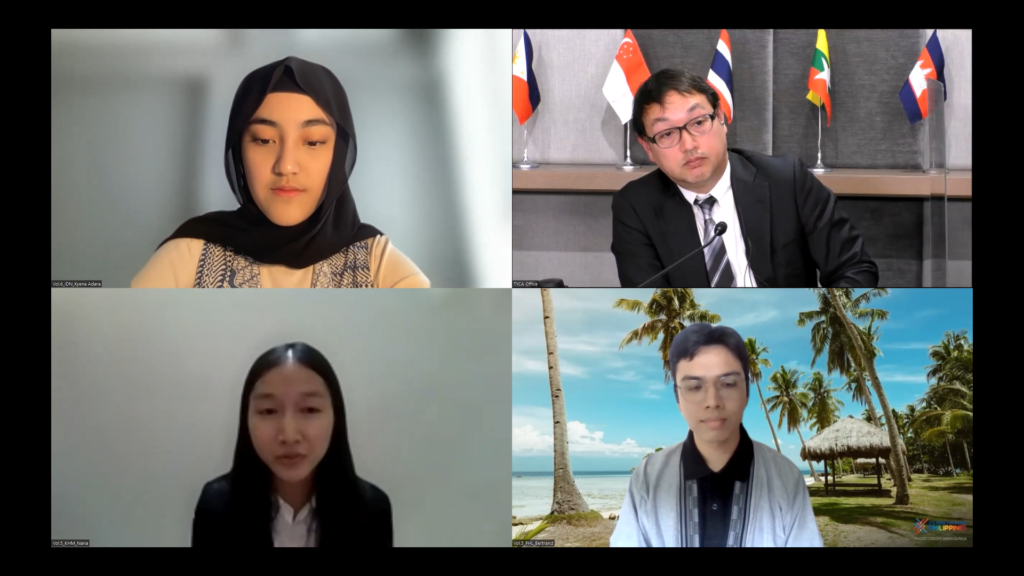
Nana, a discussant, who joined Vol.5, and now majors in narutal resources management and development at university, totally supported Kyena’s dream to be an architect who can contribute to the environment, as countries around the world including her own country, Cambodia, needs greener community, and more and more environmentally-friendly facilities must be built including schools. In the context of such discussion, he referred to the eco-school concept, proposed by one of the TYCA teams at Vol. 5, aimed to make maximum use of local natural resources across Asia, and is something that can cut back negative impacts and mitigate the effects of climate change. Nana also concurred with Kyena in that overcoming differences among people with different background and opinions means a great deal to deliver changes, and there are global issues of mutual concerns these people can tackle together.
Bertrand endorsed Kyena’s vision as recent trends in architecture is to incorporate environmental sustainability materials into buildings, such as bio-materials like Biopolymer, or clamshells, rather than traditional ceramics and plastics, while making maximum use of local resources and increasing employment. Bertrand also praised Kyena’s various volunteer activities to give back to communities, and her belief in collaborating with people with the same visions of the world, overcoming differences. Bertrand also congratulated her challenges and positive attitudes she has taken believing everything happens for a reason.
4. Healthcare
| Presenter | Ms. Lau Su Ching (Mouse) |
Malaysia, Vol.6 Manipal University College Malaysia (MBBS Student) |
| Discussion members | Ms. Lou You Ee (UE) |
Cambodia, Vol.3 Actuarial Analyst at Prudential (Cambodia) Life Assurance |
| Mr. Pavat Pichetsin (Phu) |
Thailand, Vol.5 Durham University(UK) |
 |
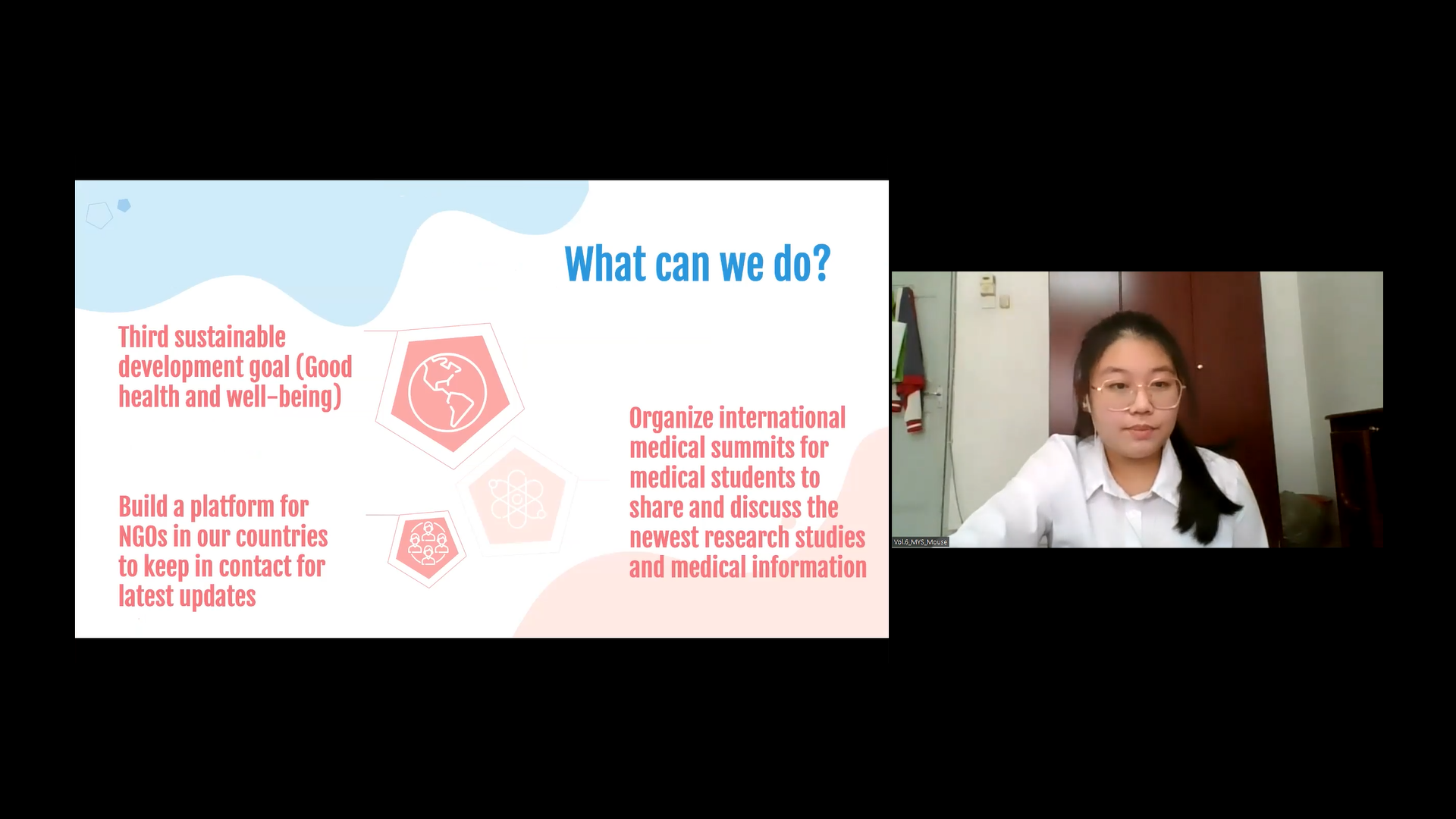 |
As a medical student, Mouse aims to create a society where medical care is equally available regardless of economic disparities. Her vision is “Advancing in paediatrics to help adolescents suffering from chronic disease and provide full medical access for them.” The scope of her vision includes establishing a financial assistance foundation to help the patients who cannot afford to receive the surgery they need.
Although ongoing Covid-19 have prevented Mouse from conducting the volunteer work based on face-to-face interaction to support refugees and hospice in Malaysia, which she was engaged in before the pandemic, she diverted her resources to online fundraising and tutoring programs to contribute as a volunteer. In the medical arena, the field of her specialty, she actively participated in a research project concerning hand hygiene during the pandemic and medical summits organized by Malaysian international medical association, MMI, to gain experiences toward her future career in medicine.
She then introduced the current status of healthcare access and its quality in Southeast Asian countries, using a chart made of the “Healthcare Access and Quality Index of South East Asian Counties,” data available from the World in Data. The data has shown more than half of the Southeast Asian countries remains at a lower ranking, and that there is insufficient access to healthcare in these countries. “This matter should be highlighted immediately.” She said.
She then discussed specific measures to resolve these problems, by referring to SDGs’ Goal No. 3, good health and well-being. She called for the support from TYCA friends to push forward with the awareness camps and programs in the future to provide a greater impact to the public. “Since TYCA friends originate from diverse Asian countries,” she said, “I believe we can build collaboration by having a platform where medical related NGOs in our countries can keep contact with each other, and international summits for medical students are organized to share and discuss the newest research studies and medical information.”
She continued, “By this way, every individual, especially those in poverty receive the best treatment they need immediately, which is very crucial for every Asian developing country.”
Mouse also talked that the impact the TYCA experiences have brought to her vision and activities. “While organizing awareness campaigns with batch mates for medical students in my university, I was able to connect my experiences at TYCA during sharing sessions, providing them with deeper insights toward SDGs, and how they are connected with the pandemic,” she said.
She also explained obstacles she is facing due to Covid-19, and her thoughts on solutions. She said one of the largest bottlenecks she was facing is the lack of social events, medical attachment programs due to the restrictions during the pandemic, as it is crucial to ensure medical students are able to balance themselves between studies and curriculum activities.
Despite these challenges, Mouse believes these hurdles can be overcome with the help of technology. She actively participated in various exchange programs through online platforms and helped organize virtual volunteer programs and events to gain worthy experiences.
While mentioning the negative effects of the Covid-19, such as increased use of plastics such as facemasks and medical gloves, unemployment, interrupted education, and the impact on mental health and behavior, she shared positive aspects of what’s happening today, such as purification in habitats and wild life, and chances to enjoy healthier lifestyles as a result of increased time of staying with family members at home due to remote working/studying requirements.
“At some point (in the future), we can probably say the pandemic brings out a good turning point to the community.” She concluded.
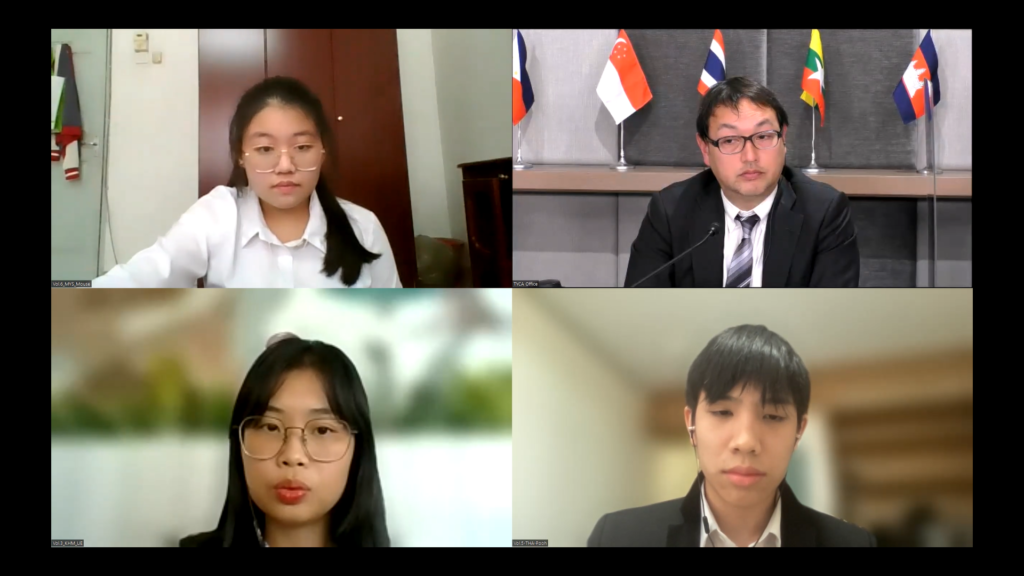
The presentation by Mouse was followed by two discussion members.
The first discussion member, UE, who joined TYCA Vol.3, is currently an analyst in an international insurance company. She strongly agreed with Mouse that quality healthcare services must be provided regardless of social status, as rapid economic development and fast growth in Asian countries have brought about huge gap between rich and the poor, and likewise the unequal access to quality healthcare between them.
In this context, she introduced an example of her company’s efforts to design insurance products tailored to meet the needs of the people with medium and lower income. UE also pointed out the need to provide relevant information to the customers or patients effectively so that they can plan for their well-being, safety of themselves and their family. She is working with her company’s tech team to digitalize and provide health-related information broadly and efficiently.
Phu, an alumnus from Vol.5, also supported Mouse’s discussion fully.
He first discussed the need for economic and systemic change to the global healthcare system that will deliver effective service to people worldwide. He introduced the examples of the insurance-based US healthcare system, and the public healthcare system of the UK., where he is studying, and pointed out the merits and demerits of these systems. Many minds must come up with, he said, ways to utilize the benefits of public health, and also introduce the aspect of economic completion to continue to improve the quality of services of healthcare.
He also mentioned importance of integrating technologies to areas such as pediatrics, as many children are suffering from chronic diseases, but these diseases are left unnoticed due to lack of instant access to medical professionals or even useful information. He believes tele-health startups and entrepreneurs then come into play, to tackle such issues. Phu finally discussed the good changes brought about by Covid-19, especially the ongoing change in the medical community including adaptation to virtual, technological services that bring enough medical services faster than ever.
Mouse appreciated the different perspectives and angles provided by UE and Phu and concluded combining the wisdom of many bright minds is exactly what society needs to come up with a better solution for world problems, especially in a difficult time like Covid-19.
5. International Relations
| Presenter | Mr. Kota Watanabe (Kota) |
Japan, Vol.4 Waseda University |
| Discussion member | Ms. Sydney Picar Mateo (Sydney) |
the Philippines, Vol.1 University of the Philippines (Diliman Campus) |
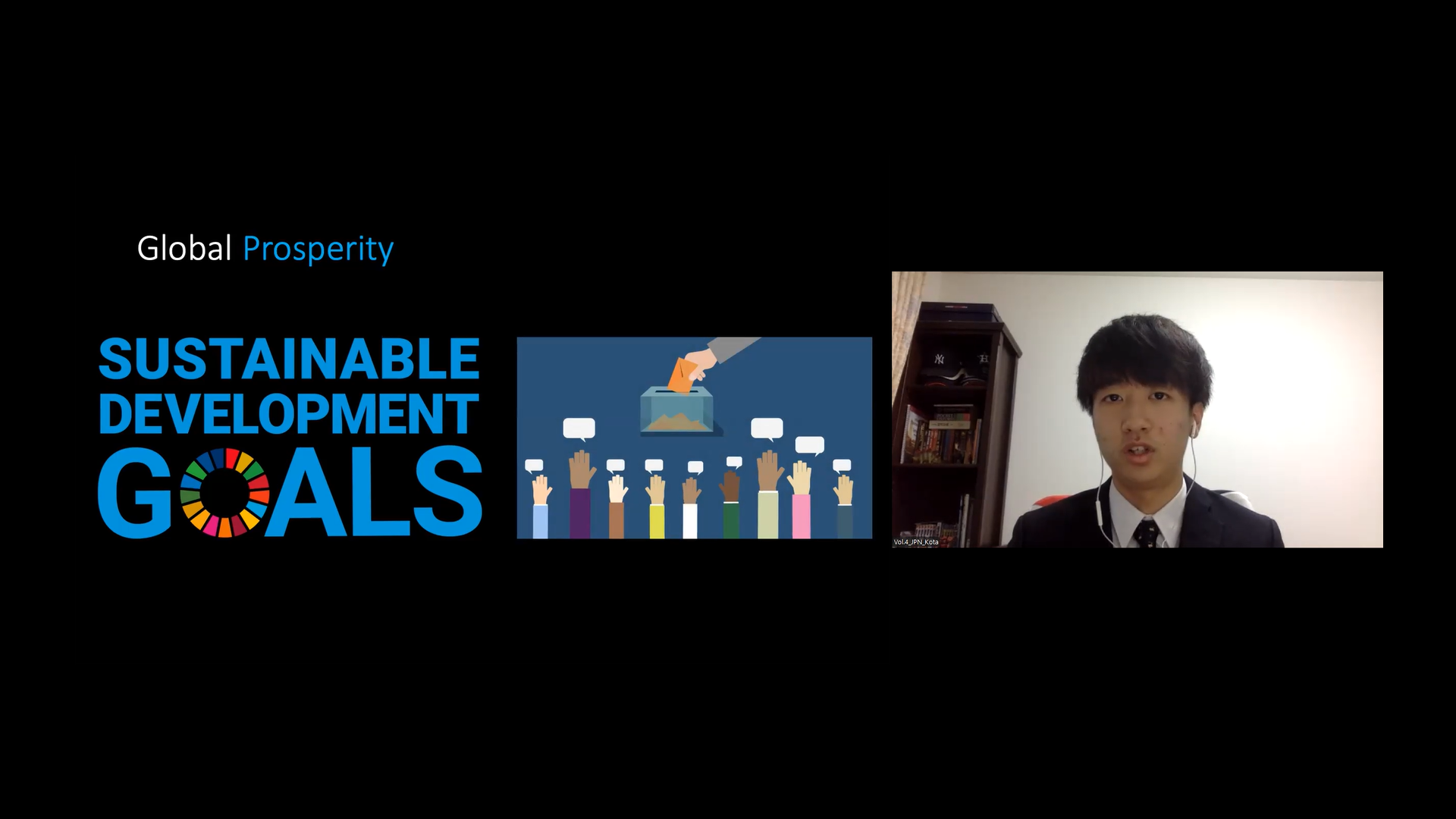 |
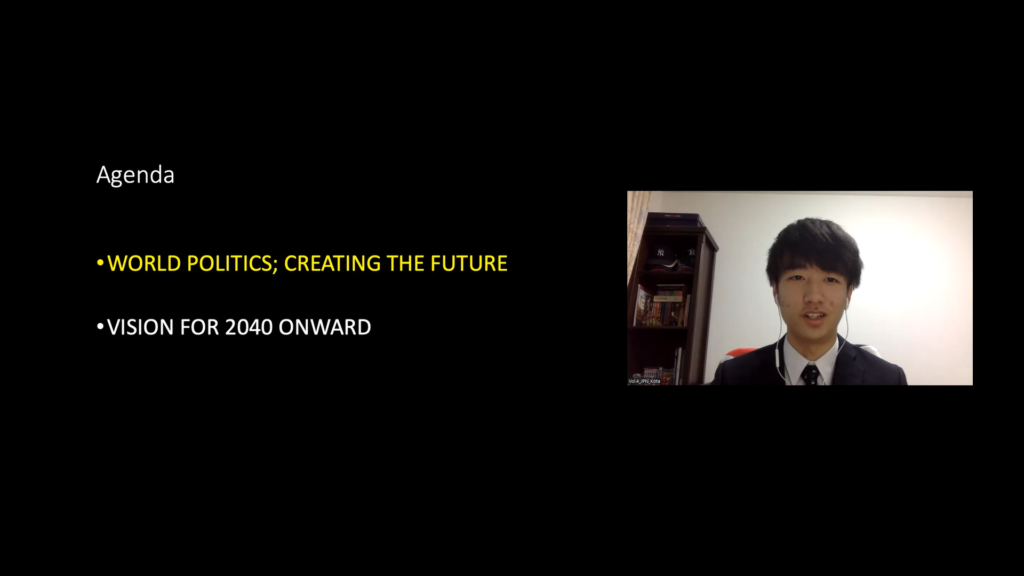 |
Inspired by his past participation in TYCA, Kota currently majors in Political Science and Economics at university in Tokyo, basing himself in a seminar on Japanese Diplomacy, and taking classes which captures international relations both from the perspective of politics and economics, such as International security and trade.
His vision for 2040 is clear and strong. “Global Peace and Prosperity via Diplomacy”.
At the outset of presentation, he first recalled the time when he was invited as a first-year high school student, 4 years ago, by his teacher, who recommended him to join TYCA. He decided to join TYCA during the Christmas holiday season, though his friends did not fully understand his motivation to spend the school holidays for outside events. He said, “TYCA was not a full-on serious event, there were moments of joking around with fellow delegates and participants, which still remain as lifelong memories for me.”
He continued that TYCA was an invaluable moment for change of his mindset.
“TYCA has definitely honed my future aspirations, since it was the first time I had been exposed to several global issues which the world faces today. Moreover, it was my first experience discussing global issues with foreign students, which I found interesting and rewarding,” he said. “I cannot thank this community enough.”
His dream of becoming an actor in world politics and diplomacy has not changed since he joined TYCA, he said, and he is making strenuous efforts to achieve the goal.
Toward the broad audience of the Alumni Summit of the day, he started the discussion of his vision with the introduction of the theme of ideology. He said, “If you take courses on this topic, you usually start by studying ideologies such as realism, liberalism, which try to explain everything based on their paradigm. But the long history has proven, that this is impossible.” Kota continued, “We must keep in mind, that International Politics, is the product of strategic interaction among sovereign states.” And he said that in the current international order founded on the Westphalian system, there is no absolute body of authority above sovereign states.
He pointed out that although international laws do exist, based largely on customs, states are substantially free to act on their own will, and therefore, countless factors influence the outcome of world politics. Therefore, his argument is instead of trying to predict everything, as members of the international community, we should try to create the future, the way we want it to be.
He then focused his discussion on the theme of maintaining peace and security, as it has been one of the leading missions inherited within International Politics, especially after the World War II, and in the absence of absolute authority above sovereign states, each state is given the ultimate choice of war or dialogue. In his discussion, the post war international order centered around the United Nations has avoided WWIII and nuclear wars, at least up to today, but also the fact that superpowers have occasionally become an actor against other states which fall inferior in terms of power, violating sovereignty and territorial integrity.
His main viewpoint is to that the international community must come up with a way to maximize the costs which could be a burden for those nations who try to enforce power to change the status quo. He introduced the bargaining model of war that suggests bargaining through dialogue is more cost-efficient than warfare. Such cost includes war casualties and loss of international trust. Alongside the bargaining model, economic sanctions, and collective security under article 51 of the UN charter, may be possible methods to further maximize the cost. He believes Japan and ASEAN can make collaborate efforts for innovation to reinforce the authority of the United Nations.
He then discussed the fact that world is interconnected than ever before and need for closer collaboration among regions and countries. The spread of the COVID-19 pandemic has highlighted, he said, “that there are issues which cannot be solved within one state. This is definitely the same for other issues such as climate change, poverty, and refugees, which brings about externalities which crosses borders.”
His firm conviction is, as he sees that in 2030 and onward, the trend will remain, or even accelerate, “it is inevitable for nations to come together, and negotiate on the same platform, sometimes making decisions which may hinder short term interests, to solve issues like those highlighted in the SDGs which we have covered in TYCA.”
Kota has experience of living in three countries, Japan, the United States, and China, and he strongly feels that freedom is also a crucial element for prosperity. He hopes Japan will further coordinate with ASEAN nations under the common value of liberty, human rights, and the rule of law, while admitting that ASEAN has its own sovereignty as a region, in deciding the power balance in the region. He wants to see continued dialogue and exchange between Japan and ASEAN countries.
Kota concluded his presentation by asking an open question. “What is National Interest? and introduced a quotation by an senior American political scientist, Joseph Nye, “The definition of national interest is always open for discussion.” Kota believes the process of defining national interest is a battlefield for political decision making based on various ideologies, but he believes that “such discussion should be supplemented with long-term, wide perspectives, for achieving peace and prosperity.”
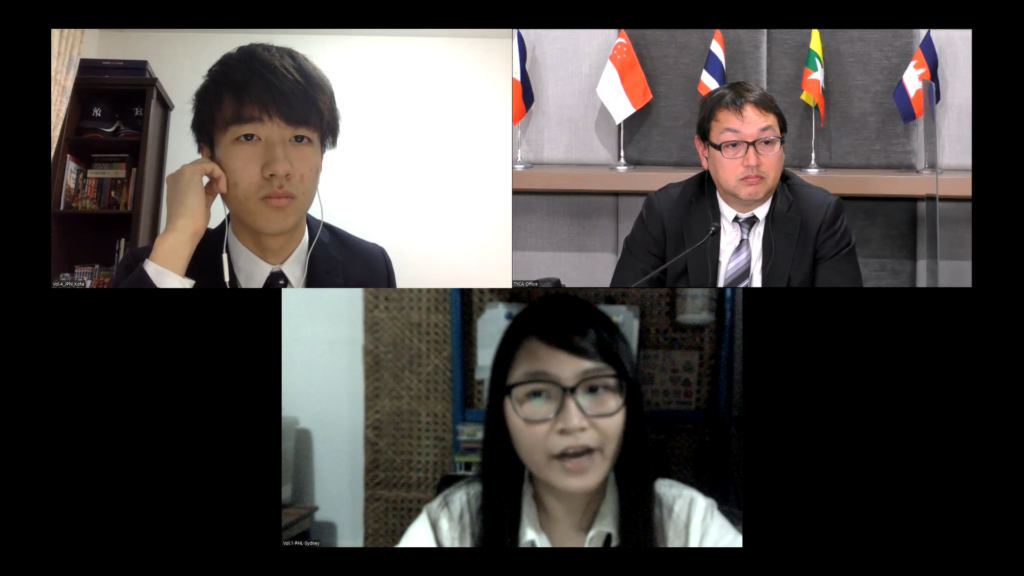
Sydney, an alumnus from the TYCA Vol.1, thanked Kota for giving a presentation about his lofty goal of achieving peace and prosperity through international diplomacy. In order to realize the vision, she mentioned the need to have optimism and sincere dialogues in international diplomacy. Although the word “peace” is an abstract concept itself, she said, the word must be put down to concrete terms, so that government and the public can mutually understand what it actually means and they can consider necessary actions to achieve it, and both sides of the subject of negotiation can move forward toward possible agreement. On top of sensitive international issues which are present in actual world politics, there are major global issues such as environmental pollution and effects of climate change, or down to issues in medical care, picked up in this Summit. Sydney concluded her comment with her strong hope that the TYCA members will step up collaboration among them, and the society will come up with effective solutions to bring about tangible changes.
| Organizers | Toshiba International Foundation (TIFO), ASJA International |
| Production | BeGood Cafe(Non Profit Organization) |
